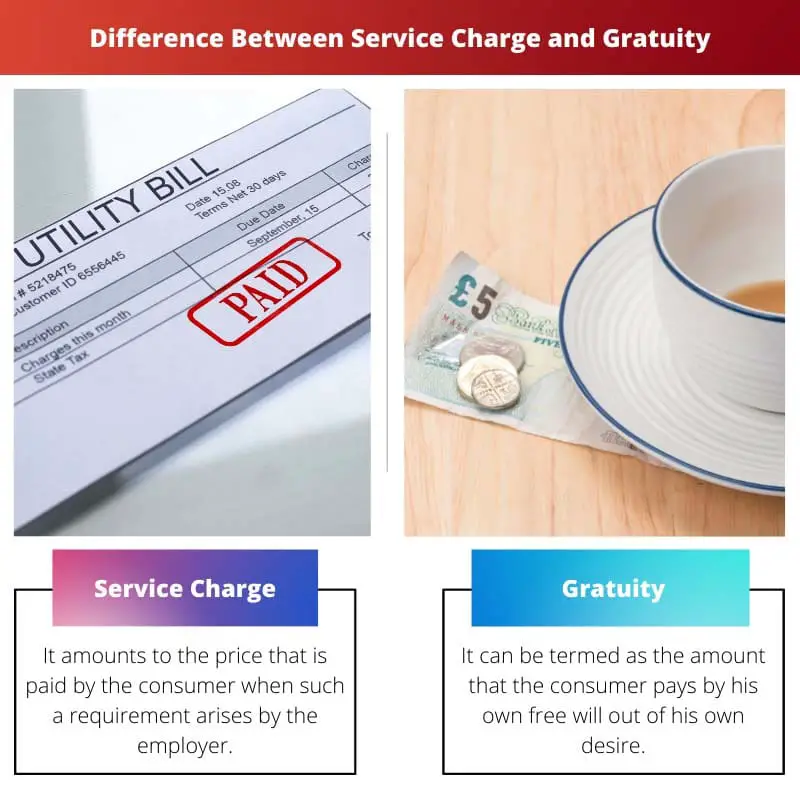People all over the world love vacations and staying at different places. This can be for professional reasons and for personal entertainment as well, but one thing here remains common, that is the places which people use to accommodate in.
Hotels or resorts or salons, etc., are commonly referred to as being places where people visit or reside to consume their services.
They offer a number of services such as food accommodation, laundry and many more, but all these services come with their own price.
When we talk about price at these places, there are two terms that are used interchangeably but carry a lot of differences. These terms are service charge and gratuity, also called tip.
To know the exact meaning and use of these two, it is important to have known the differences that lie between these two.
Key Takeaways
- A service charge is a mandatory fee imposed by a business for a service provided.
- Conversely, gratuity is a voluntary payment made by the customer to the service provider as a token of appreciation for the service provided.
- Service charge is included in the bill amount, whereas gratuity is given separately.
Service Charge vs Gratuity
The difference between Service Charge and Gratuity is that the former refers to the price paid by a consumer upon receiving certain services. It is the price of that particular product or service. It consists of the fee for that particular service. While on the other side, a Gratuity is commonly known by the name tip. It is the amount that the consumer willingly pays to the service provider out of gratitude.

Service Charge refers to the amount or the percentage of the whole bill amount that the consumer pays with respect to the service provided to him.
It happens to be separate from the amount of product that he consumes and is given in return for the overall service provided by the organization.
In certain countries, this charge happens to be mandatory, while in some, it is optional. These charges are levied in order to pay the employees of the organization directly.
While on the other hand, Gratuity, commonly referred to as Tip, is the amount that the customer determines and pays by his own free will. It can be his desire to do a good deed or help the employees of the organization directly.
These are not mandatory and are asked by the company. This is what the customer decides to give.
Comparison Table
| Parameters of Comparison | Service Charge | Gratuity |
|---|---|---|
| Meaning | It amounts to the price that is paid by the consumer when such a requirement arises by the employer. | It can be termed as the amount that the consumer pays by his own free will out of his own desire. |
| Also known as | Service fee | Tip or tips |
| Given to | It is included in the bill given by the service provider and is given to the employees after the whole collection. | It is not included anywhere in the gross bill amount and is given to the employee who receives it. |
| Compulsoriness | It is sometimes mandatory, while sometimes non-mandatory. | It is not at all mandatory and completely out of free will. |
| Types | No other type is available. | Centralized and Decentralized tip |
| Examples | Foodservice charge, salon booking charge, etc. | Cash or electronic payment received as a tip. |
What is Service Charge?
Service Charge collectively refers to the price or monetary value that an organization charges from the consumer as a remuneration for their service.
This is also called the fee or the service fee and happens to be separate from the amount that is paid for a particular product.
For example- if one consumes food of 1000 Rs from a restaurant and they levy a 5% service charge upon it.
Then the 1000 Rs is the total bill that reflects the value of the product consumed by the consumer, while the 5% reflects the charge that the organization is asking for in return for its consumer service.
This fee is, however, mandatory in certain countries while optional in certain countries. After the introduction of GST in the Indian market, the Service charge has become optional, and the consumer can deny paying it.

What is Gratuity?
Another name for Gratuity is Tip, and it is the amount that the customer decides to pay the worker serving him with a certain service. This price is exclusive of the basic price of that particular service and happens to be a voluntary one.
A customer cannot be compelled to pay this amount, and the inspiration for this payment happens to be the customer only.
An example of the same can be A person who walks into a salon and gets a haircut. He pays rupees 1000 for the same.
However, that person really likes the work done by the stylist and pays him 200 rupees for his great work. This additional sum of money is what we call Gratuity.
This comes out of good intentions and cannot be asked by the employee or the employer. Also, this does not get reflected in the bill amount as well.
Usually, the customer decides that to whom this payment should be given, but the policies of certain companies divide this amount among all the employees involved in that work.

Main Differences Between Service Charge and Gratuity
- Service Charge refers to the price that is paid by the consumer when such a requirement arises by the employer. When we talk about Gratuity, we refer to the amount that is paid to the employees by the consumer out of his own will to do so.
- Service Charge can be imposed upon the customer, while Gratuity cannot be levied upon and comes totally from the consumer’s fees.
- Service Charge is also known as a service fee, while Gratuity is known as Tip also.
- Service Charge is sometimes mandatory while sometimes nonmandatory. But a Gratuity is completely voluntary.
- There is no defined type of Service Charge, but Gratuity can be divided into centralized and decentralized gratuity.

- https://journals.sagepub.com/doi/abs/10.1177/1096348014525636
- https://www.sciencedirect.com/science/article/pii/S1053535700000627
Last Updated : 24 July, 2023

Chara Yadav holds MBA in Finance. Her goal is to simplify finance-related topics. She has worked in finance for about 25 years. She has held multiple finance and banking classes for business schools and communities. Read more at her bio page.

The article effectively highlights the nuances of service charge and gratuity, making it easier to grasp the significance of these concepts.
Agreed, the detailed comparison is quite insightful.
The article’s detailed explanation of service charge and gratuity provides valuable insights, making it an essential read for those seeking clarification on these terms.
I appreciate the thorough analysis of service charge and gratuity that the article presents.
The content offers a highly informative discussion on service charge and gratuity, adding significant value to the reader’s knowledge of these financial concepts.
This article contributes substantially to the understanding of service charge and gratuity through its clear and detailed comparison.
The article is informative and presents a comprehensive comparison between service charge and gratuity, which enriches the reader’s understanding of these concepts.
I found the article to be highly educational and insightful. It effectively elucidates the differences between the two terms.
The content provides a thorough understanding of the differences between service charge and gratuity, making it a worthwhile read.
The article contributes greatly to the understanding of these concepts through a clear and detailed analysis.
I appreciate the in-depth explanation of these terms in the article.
The article provides valuable insights into the differences between service charge and gratuity, making it easier to comprehend these concepts.
The article offers a comprehensive analysis that enhances understanding. Well done.
I found it enlightening and well-researched. Thank you for sharing.
Thank you for the informative article about service charge and gratuity. It’s helpful to understand the key differences and implications of these terms.
I agree, the article provides a clear explanation of the distinctions between service charge and gratuity.
I appreciate the detailed comparison provided in the article, it’s quite informative.
The article offers an enlightening perspective on service charge and gratuity, providing clarity on their definitions and implications.
The article delivers a well-constructed comparison of service charge and gratuity, offering valuable insights into these financial terms.
I found the analysis of service charge and gratuity to be especially informative and thought-provoking.
The article presents an in-depth examination of service charge and gratuity, enhancing the reader’s understanding of these concepts.
I commend the article for its comprehensive and elucidating discussion on service charge and gratuity.